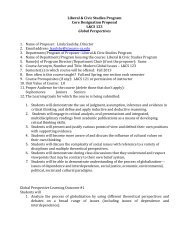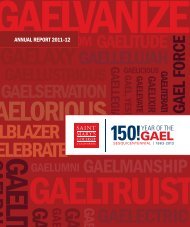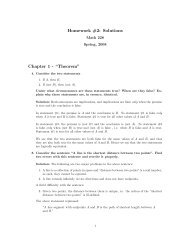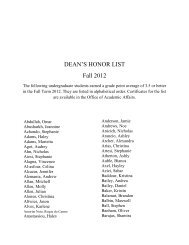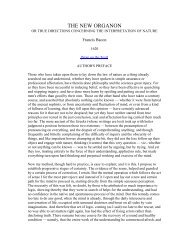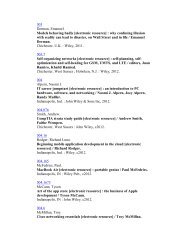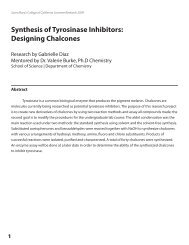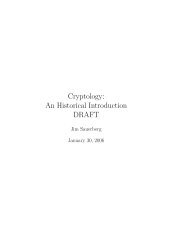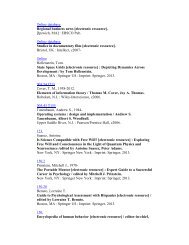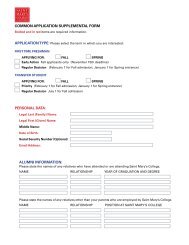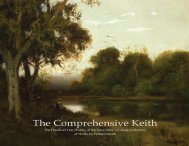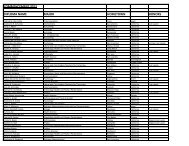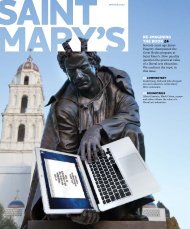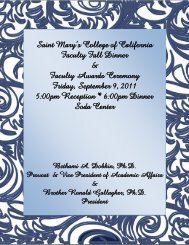2008-09 Catalog - Saint Mary's College of California
2008-09 Catalog - Saint Mary's College of California
2008-09 Catalog - Saint Mary's College of California
Create successful ePaper yourself
Turn your PDF publications into a flip-book with our unique Google optimized e-Paper software.
Collegiate Seminar CurriculumCollegiate SeminarThe faculty <strong>of</strong> the Collegiate Seminar program is drawn from all departments <strong>of</strong> the <strong>College</strong>.Since 1941, the Collegiate Seminar program has played a key role in the undergraduate academic experience at <strong>Saint</strong>Mary’s <strong>College</strong>. In introducing students to the great writings that have shaped the thought and imagination <strong>of</strong> the Westernworld, the program aims to develop in students skills <strong>of</strong> analysis, critical thinking, interpretation and communication thatwill help them read and discuss significant works with increased understanding and enjoyment. More specifically, the programbrings students into direct contact with the works <strong>of</strong> great minds — poets, philosophers, scientists, historians — tohelp them understand the ideas that have shaped the present. In addition, the Collegiate Seminar program sees theseencounters as opportunities to cultivate habits <strong>of</strong> careful and disciplined reading so that students can discover for themselvesthe meanings embodied in any works that they may read, not just those drawn from the Great Books canon.The Collegiate Seminar program involves all undergraduate students and faculty throughout the schools and academicdepartments <strong>of</strong> the <strong>College</strong>. For both students and faculty, engagement in the Collegiate Seminar program transcendsindividual disciplines and programs <strong>of</strong> study. The program is based on a genuine sense <strong>of</strong> collegiality and reflects the basicidentity <strong>of</strong> the <strong>College</strong> as an intellectual community. It <strong>of</strong>fers students and faculty <strong>of</strong> different departments the opportunityto meet and to interact. Though given to different ways <strong>of</strong> seeing and thinking, students and faculty join to share acommon experience — the reading and discussion <strong>of</strong> the same great texts.Classes meet around a seminar table in small groups so that each person can participate actively in the discussion. The facultydiscussion leader establishes questions about the texts in order to challenge the students to develop, through the process <strong>of</strong>discussion, defensible interpretations <strong>of</strong> their own. Discussion entails the stating <strong>of</strong> opinions and the uncovering <strong>of</strong> assumptions;students present evidence to support their position or to defend it against objections; they respond to other students’views, exposing contradictions and clarifying ambiguities. Via substantial writing assignments, students continue theirinquiry into the texts, developing a thesis supported by cogent analysis based on textual evidence. Through engagement indiscussion and writing, students are encouraged to read actively, to think critically, to listen well, to converse in a spirit <strong>of</strong>cooperation, and to reflect upon and refine their ideas and opinions, developing skills they can use throughout their lives.All freshmen take Seminar 20 in fall and 21 in spring and are expected to complete 122 during the sophomore year and123 during the junior year. All transfer students enroll in Seminar 110 and additional seminars as required.Collegiate Seminar Governing BoardCharles Hamaker, Ph.D., Associate Pr<strong>of</strong>essor, Mathematics,Director <strong>of</strong> the Collegiate Seminar ProgramDeanne Kruse, M.A., Program ManagerCatherine Marie Davalos, M.F.A., Associate Pr<strong>of</strong>essor, Performing ArtsRebecca Engle, Ph.D., Adjunct, Performing ArtsBrother Martin Fallin, FSC, M.A., LecturerRobert Gardner, AFSC, M.A., Adjunct, Liberal and Civic StudiesBarry Horwitz, M.A., Adjunct, English and DramaJoan Peterson, Ph.D., Pr<strong>of</strong>essor, School <strong>of</strong> EducationEdward Porcella, Ph.D., Associate Pr<strong>of</strong>essor, Integrated Liberal ArtsVirginia Smith, M.B.A., Adjunct, AccountingGrete Stenerson, LecturerMichael Lisanti, M.B.A., LecturerDana Herrera, Ph.D., Associate Pr<strong>of</strong>essor, AnthroLearning OutcomesAs a result <strong>of</strong> their participation in the Collegiate Seminar program, students will:• Develop increased appreciation for great books as demonstratedby their habit <strong>of</strong> seeking out good reading.• Grow in their understanding <strong>of</strong> some great ideas <strong>of</strong> humankindand <strong>of</strong> the problems and dilemmas that people have struggled withover the millennia.• Grow in their intellectual curiosity.• Grow in their appreciation and understanding <strong>of</strong> different ways <strong>of</strong>knowing (e.g., philosophical, literary, historical, scientific, artistic, etc.).• Develop simultaneously a tolerance for ambiguity and a desire forclarity, recognizing that ideas and human life are complex and noteasily explainable.77



